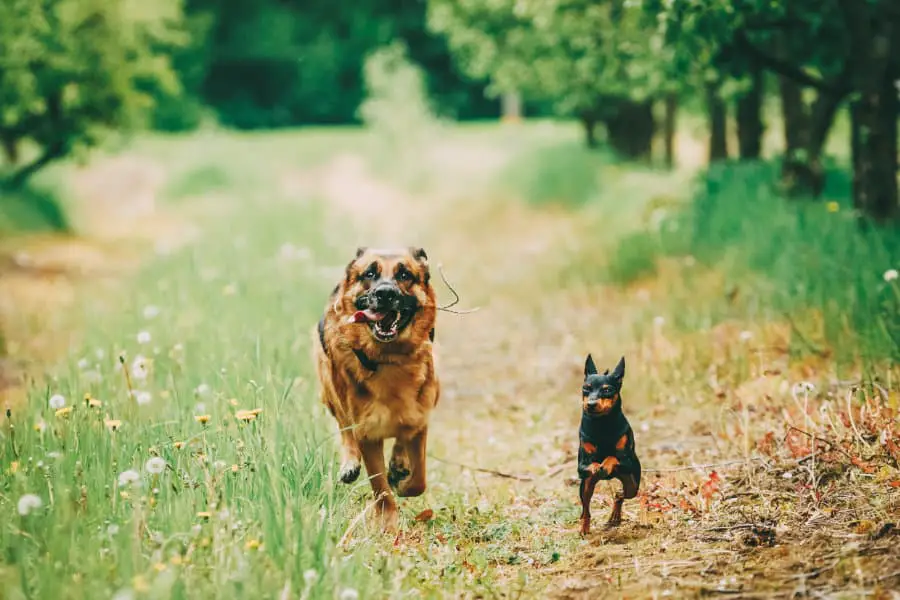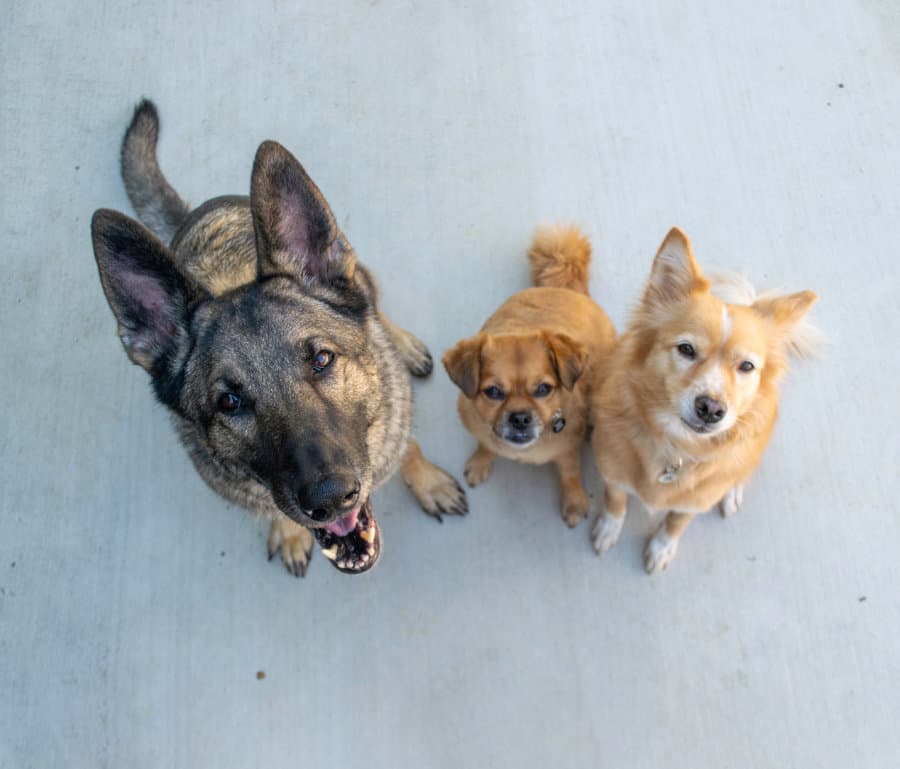German Shepherds are known to many as intelligent, loyal, and energetic animals. However, some people question if their size and strength pose a threat to smaller dogs. The answer largely depends on the way they are trained.
German Shepherds do well with small dogs if they are properly trained. An untrained German Shepherd can be territorial or predatory towards dogs and even other people. Certain traits make German Shepherds more inclined to behave in specific ways, but excessive anger is never acceptable.
This article will explain why German Shepherds can have issues with small dogs and how you can fix them. If you want to be sure your dogs are safe, calm, and happy, keep reading.

Signs Of Aggression
German Shepherds, like all dogs, have certain tells that show they’re getting irritated or angry. If you can recognize these signs before it’s too late, you can prevent a dog fight from breaking out.
Also, irritation, fear, and anger are commonly intertwined with each other. Dogs don’t get angry for no reason. Like humans, there has to be some perceived problem for a German Shepherd to lash out at another dog.
Warning Signs
Common signs include:
- Freezing or becoming rigid
- Staring
- Pinning their ears back
These behaviors signal that your German Shepherd feels that something is wrong. They don’t just display these behaviors around other dogs; it’s common dog body language in any fearful situation.
Getting Ready To Fight
If they are getting ready to fight, you will hear them:
- Growling
- Snarling
- Barking
To avoid this type of behavior from escalating, it’s best to lead your dog in the opposite direction and get the other dog (or whatever is making them bark) out of their eyesight.
Attack Mode
They are in attack mode if you can see them:
- Baring their teeth
- Lunging
- Biting
The last section is what we most want to avoid. If a German Shepherd attacks a smaller dog, they can leave the other one with permanent damage or even worse. But before we go into any more details, we would like to state that German Shepherds and other large breeds aren’t inherently more dangerous than others.
All dogs have the potential to be aggressive, hostile, and dangerous, regardless of their size or breed. But we can admit that even the meanest Chihuahuas can’t do as much damage as a German Shepherd or Rottweiler.
Traits & Behaviors
Some of the fundamental characteristics attributed to German Shepherd Dogs (or GSDs) are:
- Loyalty
- Intelligence
- Courage
- Strength
- Obedience
These characteristics are somewhat of a double-edged sword. As wonderful as loyalty is, it can quickly turn into over-protectiveness if you don’t properly train your dog.

Why German Shepherds Can Be Aggressive Towards Smaller Dogs
Aggression and other behavioral problems are often rooted in lousy living environments, improper training, and a series of unfortunate experiences. You’ll have to find the exact source of your German Shepherd’s aggression to fix it.
Fear And Anxiety
Possibly the most common reason for dog aggression is fear. German Shepherds can develop a fear of other dogs and revert to aggression if they feel they need to. German Shepherds aren’t the type to back down or run away. They’ll bark, lunge, and eventually hurt another dog if they are provoked to do so.
This is most common when they encounter a dog they don’t know. German Shepherds can be raised with smaller dogs and have no problems within their own ‘pack.’ But if they feel threatened by another dog, they can quickly learn to distrust any dog they don’t know.
Predatory Instinct
German Shepherds are primarily herders (although they can be trained to do various things) and have strong predatory instincts. They will chase anything they want. Your GSD might not want to hurt the other dog, but if they chase a smaller dog around the house, it might trigger a small dog to attack out of fear, causing a possible fight.
Protection
German Shepherds are very loyal and protective dogs. If they feel that their family needs to be protected, they will defend them. This can be a good deterrent from intruders or strangers, but if they lack proper training, German Shepherds can show signs of aggression towards someone who got too close to whatever or whoever they feel they need to protect. (Read: Will An Untrained German Shepherd Attack An Intruder?)
Resource Guarding
Possessive aggression or resource guarding is when a German Shepherd (or any dog) becomes possessive over something, be it a toy, food, or their owner. They’ll guard who or what they deem valuable and display signs of aggression if they feel like it might be taken away.
Train Your GSD To Fix Aggressive Behavior
Many behavioral problems in GSDs are caused by improper training or no training at all. The best way to stop your German Shepherds from developing behavioral issues and aggressive patterns is through adequate training. A reputable trainer will help you with obedience, impulse control and socialization.
Is It Hard To Train A German Shepherd?
German Shepherds are easy to train because of their high intellect and desire to please their owners, but to properly train your dog, it will take time and dedication. It is best to train them during the first two years of their life.
If your dog is older, you can still train and socialize, but it will be harder depending on the severity of their problems.
There’s a lot of ways to train your German Shepherd. Local pet stores have great basic training programs that socialize and train your dog at the same time, but this doesn’t help much if your dog can’t stand the sight of another. It’s good for puppies to get used to other dogs and people.
There are one-on-one programs that focus on specific issues. Although they can be a bit pricey, upwards of $2000 in some cases, for only a few weeks of training.
Socialization
Along with training, you’ll need to get them used to other dogs. If you already have other dogs, great! but that might not be enough. German Shepherds won’t have problems with a dog it’s familiar with, but they can be very hostile towards one they don’t know.
Going on walks or to a dog park exposes them to different sizes and breeds of dogs. At first, it might be challenging and even embarrassing if your dog is barking and lunging, but with proper training, they’ll get used to them and maybe even want to befriend another dog.
Final Thoughts
German Shepherds can do well with small dogs. Although we must acknowledge that German Shepherds are big and strong, and they tend to be predisposed to some behavioral issues; the most common are predatory, territorial, and fear-based anger issues. It might be hard for your German Shepherd to get along with smaller dogs, if it hasn’t socialized. The best way to prevent an accident is to train it at a young age; Older dogs can still be trained but can be more challenging.
